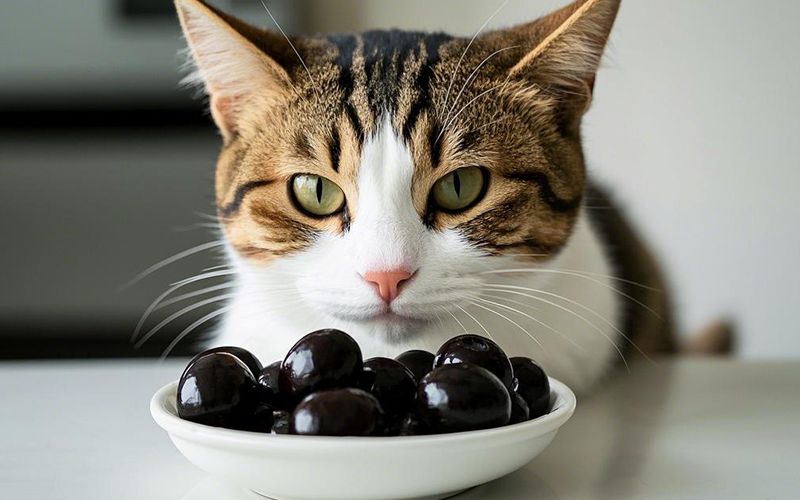Can Cats Eat Black Olives? What You Need to Know
- 15 Mar 2025 13:56
You might be wondering whether it's safe to share your snack of black olives with your cat. While olives aren’t toxic to cats, they are not a suitable food for them to eat regularly. Let’s explore why black olives might not be the best treat for your feline friend.

1. Are Black Olives Safe for Cats?
Black olives, in small quantities, are generally not toxic to cats, but they should be given with caution. While they may not cause immediate harm, olives do not provide any significant nutritional value to cats, and they can pose potential health risks if fed too often.
2. Why You Should Avoid Giving Your Cat Black Olives Regularly
Here’s why black olives should not be a regular treat for your cat:
High Salt Content: Most olives, including black olives, are packed with salt, which can be harmful to cats if consumed in large quantities. Excessive salt intake can lead to dehydration, kidney problems, and in severe cases, salt poisoning.
Pits: Olives typically contain pits, which can be a choking hazard for cats. If your cat eats an olive pit, it could cause an obstruction in their digestive tract, which may require medical intervention to remove.
Not Nutritious for Cats: Olives do not provide essential nutrients that cats need, such as protein or taurine, which are vital for their health. While olives contain some healthy fats, they aren’t an ideal food source for cats, who thrive on meat-based diets.
Potential Digestive Upset: If your cat eats too many olives, especially the brined or pickled kind, it may cause digestive upset, including vomiting or diarrhea. Cats’ digestive systems are not designed to process the oils and other ingredients found in olives.
3. What to Do If Your Cat Eats Black Olives
If your cat eats a black olive, there’s no need to panic, especially if it was just one or two. However, monitor them for any signs of digestive distress, including:
Vomiting
Diarrhea
Lethargy
Excessive thirst or urination (if they’ve consumed too much salt)
If your cat shows any of these symptoms or ingests a large amount of olives or the pit, it's best to contact your veterinarian for advice.
4. Healthier Alternatives to Black Olives for Cats
If you're looking for healthier treat options for your cat, there are plenty of alternatives that are both safe and nutritious:
Cooked Chicken or Turkey: These are excellent sources of protein and are much more aligned with your cat’s nutritional needs.
Pumpkin: Plain, cooked pumpkin is a great fiber-rich treat that can help with digestion and is much safer for cats.
Fish: Tuna or salmon (without bones or seasoning) are great protein-packed options and loved by many cats.
Cat Grass: Some cats enjoy nibbling on cat grass, which is a safe and healthy way to provide some fiber.
5. How PettureX Can Help You Make Safe Food Choices for Your Cat
If you're ever unsure about what foods are safe for your cat, PettureX can assist you with 24/7 guidance. PettureX is a pet health AI assistant that provides instant advice on dietary concerns, and its image recognition tool can help identify whether a particular food is safe for your cat. 🐱📱
6. Conclusion: Can Cats Eat Black Olives?
While black olives are not toxic to cats, they should only be offered in small quantities and on rare occasions due to their high salt content and lack of nutritional value. Avoid giving your cat olives regularly, especially if they are brined or contain pits. There are plenty of healthier and safer treat options available for your cat that will better support their well-being.
If you're unsure about any food item for your cat, PettureX is always there to help you make informed decisions for your pet’s health! 🐾🥒
Related

The Burning Question: Can Cats Eat Jalapenos? A Comprehensive Safety Guide
- 21 Apr 2025
Cool Temptation: Can Cats Eat Ice Cream Safely? The Vet-Backed Truth
- 21 Apr 2025
Frankly Dangerous: Can Cats Eat Hot Dogs? Vet Explains the Serious Risks
- 16 Apr 2025
A Purrfect Protein? Can Cats Eat Ground Turkey Safely? (Vet-Reviewed Guide)
- 16 Apr 2025
Gritty Situation: Can Cats Eat Grits Safely? Vet Explains the Risks
- 16 Apr 2025
Gravy Danger Zone: Can Cats Eat Gravy Safely? (Vet-Reviewed Warning)
- 16 Apr 2025
Crunchy Query: Can Cats Eat Green Peppers? A Vet-Reviewed Safety Analysis
- 16 Apr 2025
Toxic Temptation: Can Cats Eat Grapefruit? Vet Explains the Dangers
- 16 Apr 2025
Emergency Meal or Major Mistake? Can Cats Eat Dog Food For A Couple Days? (Vet Guide)
- 16 Apr 2025
Dandelions & Felines: Can Cats Eat These Common Weeds Safely? Vet Explains
- 16 Apr 2025
